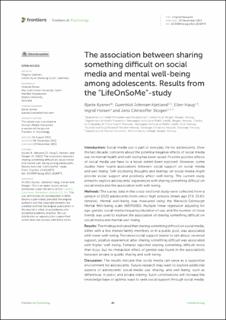| dc.contributor.author | Kysnes, Bjarte Birkeland | |
| dc.contributor.author | Hjetland, Gunnhild Johnsen | |
| dc.contributor.author | Haug, Ellen Merethe Melingen | |
| dc.contributor.author | Holsen, Ingrid | |
| dc.contributor.author | Skogen, Jens Christoffer | |
| dc.date.accessioned | 2022-12-23T10:00:55Z | |
| dc.date.available | 2022-12-23T10:00:55Z | |
| dc.date.created | 2022-12-16T17:32:26Z | |
| dc.date.issued | 2022 | |
| dc.identifier.issn | 1664-1078 | |
| dc.identifier.uri | https://hdl.handle.net/11250/3039360 | |
| dc.description.abstract | Introduction: Social media use is part of everyday life for adolescents. Over the last decade, concerns about the potential negative effects of social media use on mental health and well-being has been raised. Possible positive effects of social media use have to a lesser extent been explored. However, some studies have found associations between social support on social media and well-being. Self-disclosing thoughts and feelings on social media might provide social support and positively affect well-being. The current study aimed to explore adolescents’ experiences with sharing something difficult on social media and the association with well-being.
Methods: The survey data in this cross-sectional study were collected from a sample of 2023 adolescents from senior high schools (mean age 17.4, 55.6% females). Mental well-being was measured using the Warwick-Edinburgh Mental Well-being scale (WEMWBS). Multiple linear regression adjusting for age, gender, social media frequency/duration of use, and the number of close friends was used to explore the association of sharing something difficult on social media and mental well-being.
Results: The findings indicated that sharing something difficult on social media, either with a few friends/family members or in a public post, was associated with lower well-being. Perceived social support (easier to talk about, received support, positive experience) after sharing something difficult was associated with higher well-being. Females reported sharing something difficult more than boys, but no interaction effect of gender was found in the associations between private or public sharing and well-being.
Discussion: The results indicate that social media can serve as a supportive environment for adolescents. Future research may want to explore additional aspects of adolescents’ social media use, sharing, and well-being, such as differences in public and private sharing. Such contributions will increase the knowledge base of optimal ways to seek social support through social media. | en_US |
| dc.language.iso | eng | en_US |
| dc.publisher | Frontiers | en_US |
| dc.rights | Navngivelse 4.0 Internasjonal | * |
| dc.rights.uri | http://creativecommons.org/licenses/by/4.0/deed.no | * |
| dc.title | The association between sharing something difficult on social media and mental well-being among adolescents. Results from the “LifeOnSoMe”-study | en_US |
| dc.type | Journal article | en_US |
| dc.type | Peer reviewed | en_US |
| dc.description.version | publishedVersion | en_US |
| dc.rights.holder | Copyright 2022 The Author(s) | en_US |
| dc.source.articlenumber | 1026973 | en_US |
| cristin.ispublished | true | |
| cristin.fulltext | original | |
| cristin.qualitycode | 1 | |
| dc.identifier.doi | 10.3389/fpsyg.2022.1026973 | |
| dc.identifier.cristin | 2094625 | |
| dc.source.journal | Frontiers in Psychology | en_US |
| dc.identifier.citation | Frontiers in Psychology. 2022, 13, 1026973. | en_US |
| dc.source.volume | 13 | en_US |

